
Virtualidad Educacion y Ciencia
Scope & Guideline
Fostering Dialogue in the Evolving Landscape of Virtual Learning
Introduction
Aims and Scopes
- Integration of Digital Technologies in Education:
The journal emphasizes the use of information and communication technologies (ICT) in educational settings, exploring how these tools can enhance teaching and learning experiences. - Childhood Education and Technology:
A significant focus is placed on the impact of technology on childhood education, examining how children interact with digital media and how educators can effectively integrate these technologies into their teaching. - Teacher Training and Professional Development:
The journal addresses the professional development of educators, particularly in adapting to digital environments and utilizing innovative teaching strategies. - Research on Virtual Learning Environments (VLEs):
There is a consistent exploration of virtual learning environments and their effectiveness in facilitating education, particularly in higher education contexts. - Cultural and Social Implications of Technology in Education:
The journal investigates the cultural and social dimensions of technology use in education, particularly how it affects diverse populations, including immigrant families.
Trending and Emerging
- Impact of the COVID-19 Pandemic on Education:
There is a notable trend in examining how the pandemic has reshaped educational practices, with a focus on remote learning, digital tools, and the experiences of both educators and students. - Use of Video Games and Gamification in Learning:
An increasing interest in the incorporation of video games and gamified learning experiences in educational settings is evident, highlighting their potential to engage students and facilitate learning. - Digital Literacy and Competence Development:
Research is increasingly focusing on the development of digital literacy and competencies among both students and teachers, underscoring the importance of these skills in modern education. - Cultural and Ethical Considerations in Technology Use:
Emerging discussions around the cultural implications of technology use in education, particularly regarding children's interaction with screens and the impact on their cultural identity. - Empirical Studies on Educational Practices:
There is a growing emphasis on empirical research that evaluates specific educational practices and their outcomes, especially in virtual or blended learning environments.
Declining or Waning
- Traditional Pedagogical Methods:
There seems to be a waning interest in traditional teaching methods that do not incorporate technology, as the journal increasingly prioritizes innovative, technology-driven approaches. - General Educational Theory without Technology Focus:
Papers that discuss educational theory in a general sense without a specific focus on technology or virtuality are becoming less common, reflecting a shift towards more applied research in digital contexts. - Non-Digital Literacy Topics:
The journal is moving away from discussions solely centered on non-digital literacy, as the emphasis is now on digital literacy and its implications for contemporary education. - Broad Educational Research without Contextual Analysis:
There is a decline in broad educational research that lacks contextual analysis, particularly in relation to the specific impacts of the pandemic and digital technologies.
Similar Journals
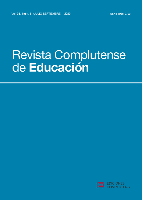
Revista Complutense de Educacion
Fostering Discourse on Contemporary Educational ChallengesRevista Complutense de Educación is a prominent academic journal published by Universidad Complutense de Madrid, specifically from their Servicio de Publicaciones. With an ISSN of 1130-2496 and an E-ISSN of 1988-2793, this open-access journal has been disseminating knowledge in the field of education since 1990, making it a valuable resource for researchers, educators, and practitioners alike. The journal encompasses a wide array of topics pertinent to educational theory, practice, and innovations, and has established its credibility in the academic community, as reflected in its Q3 ranking in the field of Education according to Scopus. Ranked #673 out of 1543 in the Social Sciences Education category, with a 56th percentile ranking, it serves as a vital platform for scholarly discourse and the sharing of cutting-edge research. With a convergence of contributions from 2009 to 2024, the Revista Complutense de Educación continues to enhance the landscape of educational research, promoting a better understanding of contemporary educational challenges and solutions.
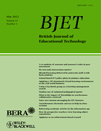
BRITISH JOURNAL OF EDUCATIONAL TECHNOLOGY
Championing Evidence-Based Practices in Education TechnologyBRITISH JOURNAL OF EDUCATIONAL TECHNOLOGY, published by Wiley, is a leading journal in the field of educational technology, recognized for its commitment to advancing research and practice in this dynamic arena. With an impressive impact factor that places it in the Q1 quartile for both Education and E-learning in 2023, it serves as a critical resource for academics, practitioners, and policymakers alike. This journal, with an established publication history since 1970, focuses on the integration of technology in educational settings, aiming to disseminate innovative findings and facilitate discussions that enhance learning experiences. Researchers contributing to the journal address diverse topics from digital learning environments to the pedagogical implications of emerging technologies, ensuring comprehensive coverage of the latest trends and methodologies. Submissions are welcomed in various formats, promoting collaborative scholarly dialogue in fostering effective educational practices. Access to the journal is available through traditional subscription frameworks, ensuring broad accessibility for institutions and individuals invested in the advancement of educational technology.

International Journal of Education in Mathematics Science and Technology
Exploring new horizons in mathematics, science, and technology education.The International Journal of Education in Mathematics Science and Technology (ISSN: 2147-611X, E-ISSN: 2147-611X) is an esteemed publication dedicated to advancing knowledge and research in the fields of mathematics, science, and technology education. Published by Necmettin Erbakan University in Turkey, this journal serves as a vital platform for educators, researchers, and professionals to disseminate innovative methodologies, pedagogical strategies, and educational technologies. With a commendable Q2 ranking in both the Education and Mathematics categories for the year 2022, it clearly exemplifies its impact in these domains, boasting a Scopus rank of #19 out of 74 in Mathematics (miscellaneous) and a position in the 75th percentile. Although the journal has transitioned into open access, it remains committed to fostering a rich dialogue among scholars and practitioners dedicated to enhancing educational outcomes in mathematics and science. Researchers and educators interested in contributing to pedagogical advancements are encouraged to submit their work, thereby playing a part in influencing the future of education.
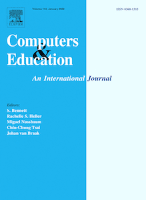
COMPUTERS & EDUCATION
Pioneering research at the intersection of education and technology.COMPUTERS & EDUCATION is a prestigious journal published by Pergamon-Elsevier Science Ltd, dedicated to advancing the understanding of the interplay between computer technology and education. With a remarkable impact factor and ranking in the Q1 category for both Computer Science and Education, this journal stands out in delivering high-quality research and innovative insights into e-learning practices. Covering a broad spectrum of topics from digital learning tools to the integration of technology in educational contexts, it serves as an essential resource for researchers, educators, and policymakers alike. Since its inception in 1976, COMPUTERS & EDUCATION has provided a platform for scholarly discussions, shaping the future of technology-enhanced learning. The journal is based in the UK, and while it does not currently offer Open Access, it remains a vital contributor to the field through its extensive publication history, converging research until 2024.
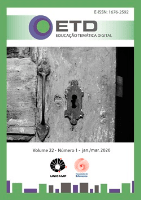
ETD Educacao Tematica Digital
Championing Open Access for Educational ExcellenceETD Educacao Tematica Digital is a distinguished academic journal published by UNIV ESTADUAL CAMPINAS, FAC EDUCACAO, and has been at the forefront of educational research since its inception in 2004. With a focus on digital education and thematic approaches, this open access journal facilitates the dissemination of knowledge and innovative practices in the field of education, making it an invaluable resource for researchers, educators, and students alike. Its dedicated editorial board fosters discourse on the integration of technology within educational frameworks, ensuring the publication of high-quality articles that resonate with contemporary challenges and advancements in education. The journal’s commitment to accessibility and scholarly rigor positions it as a leading venue for those seeking to advance their understanding and application of digital pedagogies. With the ISSN 1676-2592, ETD aims to contribute significantly to the global discourse on educational methodologies and digital learning environments.

Revista Electronica Calidad en la Educacion Superior
Pioneering Insights for Educational ReformRevista Electronica Calidad en la Educacion Superior is a prominent academic journal dedicated to advancing research in the field of higher education quality. Published by UNIV ESTATAL DISTANCIA, this journal serves as a vital platform for scholars, educators, and practitioners who are committed to enhancing the standards and effectiveness of higher education in Latin America and beyond. The journal emphasizes the dissemination of innovative ideas and practices that contribute to educational excellence. Although it operates under an open-access model, the available content can be freely accessed by researchers and interested readers to foster wider dissemination and engagement within the academic community. With its headquarters in San Pedro Montes Oca, San Jose, Costa Rica, this journal aims to bridge the gap between theory and practice, providing insights and empirical studies that help shape policy and reform in higher education. As educators and researchers increasingly focus on quality assurance and improvement in educational systems, Revista Electronica Calidad en la Educacion Superior stands out as an essential resource for aligning current practices with emerging trends and challenges in the sector.

International Journal of Technology in Education
Advancing Educational Practices with Cutting-Edge ResearchThe International Journal of Technology in Education, published by the International Society for Technology Education & Science (ISTES), serves as a vital platform for researchers, educators, and practitioners devoted to the intersection of technology and educational practices. With an E-ISSN of 2689-2758, this journal aims to showcase innovative research, case studies, and theoretical contributions that explore how emerging technologies can enhance teaching and learning. Although specific metrics like impact factor and HIndex are currently unavailable, the journal is committed to rigorous peer review and high academic standards, ensuring that all published work contributes meaningfully to the evolving landscape of educational technology. As an open-access journal, it strives to make research widely available, fostering collaboration and knowledge sharing among its audience. Whether you are a researcher exploring new horizons or a professional seeking practical applications of technology in education, the International Journal of Technology in Education is an indispensable resource.
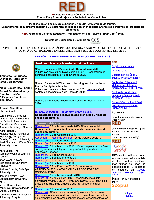
RED-Revista de Educacion a Distancia
Fostering Innovation in Distance Education MethodologiesRED-Revista de Educacion a Distancia is a premier open-access journal published by UNIV MURCIA in Spain, dedicated to advancing research in the fields of education and computer science applications. Since its inception in 2001, the journal has served as an essential platform for disseminating innovative research and practical applications of distance education methodologies. With an impressive impact factor and ranked in Q2 across both Computer Science Applications and Education categories as of 2023, RED is recognized for its significant contribution to the scholarly community, particularly within the Social Sciences and Engineering domains. Researchers and professionals are invited to explore cutting-edge studies that underpin pedagogical effectiveness and technological integration in educational settings. Based at the Edificio Pleiades Campus de Espinardo in Murcia, RED continues to foster an engaging dialogue among academics, providing insights that propel the field forward.

Computers and Education Open
Exploring the intersection of technology and pedagogy.Computers and Education Open is a pioneering open access journal published by Elsevier that focuses on advancing the field of educational technology and digital learning methodologies. Since its inception in 2020, the journal has provided a platform for researchers, educators, and practitioners to disseminate innovative findings and share insights related to the integration of computing technologies in educational settings. With its ISSN 2666-5573, this journal aims to bridge the gap between technology and education, fostering a collaborative environment for those dedicated to enhancing learning experiences through computational tools. Leveraging the rigorous standards of Elsevier's publishing excellence, Computers and Education Open attracts high-quality research that influences pedagogical practices and educational policies globally. The open access nature of the journal ensures that valuable knowledge is freely accessible, making it an essential resource for academics and professionals looking to stay at the forefront of educational advancements.

Frantice.net
Exploring New Frontiers in Social Sciences and Humanities.Frantice.net is an esteemed open access journal published by UNIV LIMOGES, dedicated to advancing knowledge across various domains including social sciences, humanities, and interdisciplinary studies. Since its inception in 2010, the journal has been committed to providing a platform for innovative research and academic discourse, featuring a diverse range of articles that contribute to the global scholarly community. Operating from its headquarters in LIMOGES, FRANCE, Frantice.net ensures broad accessibility through its open access model, empowering researchers, professionals, and students to engage with cutting-edge findings without financial barriers. The journal aims to foster collaboration and knowledge sharing, making it an essential resource for anyone pursuing academic excellence and meaningful scholarship.